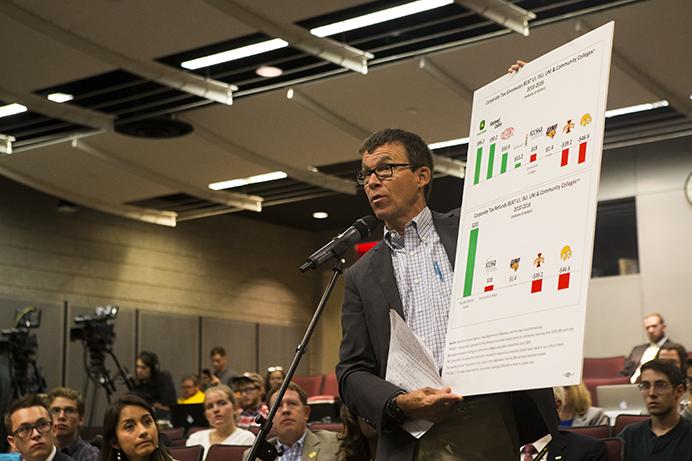The Iowa Legislature put the final nail in the fiscal coffin Wednesday with the Senate vote to deappropriate two of Iowa’s universities and other state programs and services.
After the House approved a revised version of Senate File 2117 in a party-line vote Tuesday, the deappropriations bill passed 28-21 in the Senate. The Legislature’s approval means the University of Iowa and Iowa State University will see budget cuts for fiscal 2018 amounting to $10.9 million. No cuts will be made to the University of Northern Iowa’s budget.
Now, the bill is headed to Gov. Kim Reynolds for her consideration.
The version of the legislation that passed puts the amount to be cut above the House’s earlier proposal of $8.1 million in reductions to the UI and ISU budgets and below the $14.6 million the Senate passed in February.
Total cuts to state programs and services, including the justice system and human services, amount to $35.5 million — more than $20 million below the Senate’s initially proposed reductions of $59 million.
The two universities will be forced for a second-consecutive year to figure out where to trim their budgets as fiscal 2018, which ends June 30, soon draws to a close. In 2017, the Legislature approved $20.8 million in midyear cuts for fiscal 2017 and another $9.6 million reduction for fiscal 2018, leaving the regent universities with $30.3 million less in their fiscal 2018 budgets than the prior fiscal year.
As the result of uncertainty regarding state appropriations, the regents delayed discussing tuition rates until April. In February, Regent President Mike Richards announced the regents are looking at tuition increases of less than 4 percent, scaling back on previous proposals from the UI and ISU that would increase tuition by about 7 percent.
RELATED: Iowa regent universities to make a second attempt to establish predictable tuition increases
After hearing from students and families that more predictability was needed to properly plan their finances, Richards said the regents will examine what they can do to take a multiyear approach to tuition increases. This would mean the regents would establish a baseline range of projected tuition increases for the next five or so years.
On March 7, UI President Bruce Harreld told The Daily Iowan that the universities need a long-term commitment from the state Legislature to improve the process of setting tuition. He is optimistic the regents’ plan will be wise and well-thought-out.
“… We’re not going to set tuition this year until we know where the state is, and then we’ll take that as one of the inputs as to what the total resources need to be for the institution and therefore set tuition accordingly,” he said.
The Senate unanimously passed the Future Ready Iowa Act on Monday. The plan aims to provide Iowans with job training and ensure 70 percent of Iowa workers have education or training beyond high school by 2025.
Reynolds championed the introduction of such legislation in her Condition of the State address in January.
“It’s a bill that creates opportunities for Iowans of all ages and experiences — opportunities to get the skills they need for a rewarding career,” she said. “It starts with K-12 system. I want children to know, from the earliest age, that they have options. I want them to know that trade programs and community colleges can prepare them for high-paying careers.”
RELATED: Career programs at UI leaving students prepared for workforce
Sen. Joe Bolkcom, D-Iowa City, said the Republicans’ “bungling of state finances” jeopardizes the state’s promise to provide that workforce development. He expressed concern for the effects deappropriations and tuition hikes could have on the UI’s first-generation student population in particular. First-generation students comprise nearly one-fourth of the student body.



